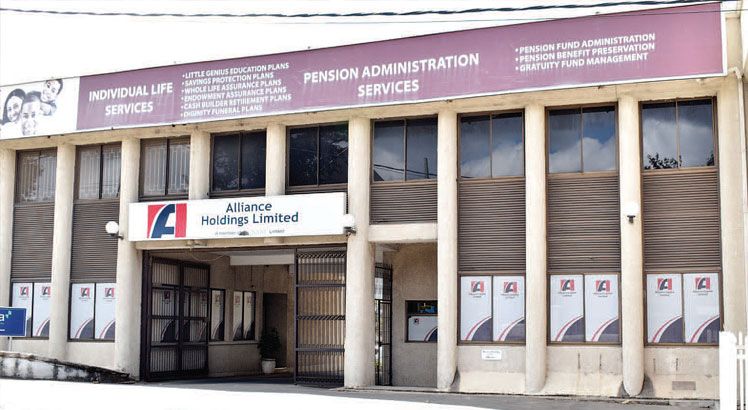By Twink Jones Gadama
In a stunning turn of events, the High Court Commercial Division has issued a groundbreaking order that Alliance Capital Limited be liquidated, following a colossal financial scandal that has rocked the nation. With billions of Kwachas, an estimated total of K60 billion, lost by countless investors, including prominent government entities and individuals, Malawi finds itself in the midst of one of the largest financial crises in its history.
Led by its managers, Christian Majavinq, and directors Tom Daniel, Dean Lungu, and Kassam Okhai, Alliance Capital was once a promising investment company, attracting funds from various entities and individuals seeking financial growth and stability. However, recent discoveries have revealed a web of deceit, as it appears that the key players behind Alliance Capital have absconded to South Africa, the United States, and India, leaving a trail of financial ruin in their wake.

Government entities have been particularly hard-hit, with hundreds of millions of Kwachas lost by prominent organizations. Among these are the Malawi Police SACCO, losing a staggering K1 billion, while both the Malawi Communications Regulatory Authority (MACRA) and Malawi Energy Regulatory Authority (MERA) face losses of K500 million each. Meanwhile, the Malawi Revenue Authority (MRA) is grappling with a colossal loss of K1 billion.
The financial havoc extends beyond government institutions, as private companies and individuals have also suffered substantial losses. Nico Assett Managers, a well-respected investment firm, has reportedly lost K3 billion, while Zamara Pension Fund and Open Connect are reeling from the loss of K2 billion each. Other notable entities, including Britam and Reunion, have also seen their investments evaporate into thin air, with losses of K500 million each. Prominent individuals like Jimmy Korea Mpatsa and Zondiwe Mbano reportedly lost K2 billion and K500 million, respectively.
Adding further tragedy to the already harrowing circumstances, numerous families and individuals, who had entrusted their life savings to Alliance Capital, are now left devastated. The Nseula family, for instance, has lost K200 million, while the Kahumbe family is struggling to cope with a loss of K500 million. The heart-wrenching reality is that these losses are not isolated incidents; there are countless others facing financial ruin due to this fraudulent scheme.
It is crucial to note that the money lost was not simply invested with Alliance Capital, but rather borrowed from various financial institutions and individuals. Among the prominent borrowers are Bright Malopa, who allegedly borrowed an exorbitant K7 billion, while Mike Chilewe Jnr and Transglobe acquired K500 million and K5 billion, respectively. Stansfield Motors’ debt stands at a staggering K5 billion. Shockingly, not a single Tambala of these borrowed funds has been repaid, exacerbating the financial crisis and crippling the lenders.
The catastrophic fallout from this scandal is far-reaching, transcending mere monetary losses. Investors’ trust in financial institutions has been severely damaged, with some now questioning the effectiveness of regulatory bodies responsible for overseeing investment activities. The implications for the overall economic landscape of Malawi are dire, as the loss of billions of Kwachas will undoubtedly result in stagnant growth, reduced investments, and a general decline in investor confidence.
The Alliance Capital scandal has now become the focal point of intense public outrage, demanding answers, accountability, and justice. The affected individuals and entities, who were lured in by the prospect of financial growth, now find themselves victims of an audacious Ponzi-like scheme. Many eagerly await the court’s decisions and subsequent legal actions to ensure that those responsible for this financial catastrophe are held accountable for their actions.
In response to this monumental crisis, the Malawian government, along with regulatory bodies, must work tirelessly to restore faith and trust in the financial sector. Immediate and comprehensive investigations are necessary to prevent similar incidents from occurring in the future. As victims continue to face the aftermath of shattered dreams and financial devastation, it is imperative that support networks and resources are established to help those most affected rebuild their lives and recover from this immense setback.
The Alliance Capital scandal has undoubtedly left an indelible mark on Malawi’s financial landscape. The billions of Kwachas lost have reverberated throughout society, from government institutions to private individuals, leaving a trail of despair in its wake. As the investigations unfold and efforts to bring the perpetrators to justice intensify, the Malawian people are left grappling with profound questions about the security of their financial future. The scars of this catastrophic event will undoubtedly endure, serving as a stark reminder of the need for vigilance, transparency, and robust regulations within the financial sector to safeguard the interests and well-being of all Malawians.


